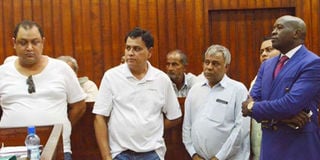We can hand over pharmacists if asking price is right

Suspects (from left) Baktash Akasha, Vijaygiri Goswami, Gulam Hussein and Ibrahim Akasha (partly hidden) with their Lawyer Cliff Ombeta at Mombasa Law Courts on January 23, 2017. PHOTO | KEVIN ODIT | NATION MEDIA GROUP
What you need to know:
Kenya learnt its lesson about thoughtlessly cooperating with other nations when it was forced to shut down its 34 embassies in Europe after aiding the arrest and deportation of the Turkish “Grandmother”, Abdullah Ocalan, in 1999.
Nothing ventured, nothing gained, or, in local parlance, you cannot lick a bare hand.
Kenya is ready to cooperate if the price is right.
Kenya has no truck with pharmacists, retail chemists and other malefactors.
Last month, Kenya was cleared to receive nearly Sh42 billion worth of military aircraft and weaponry from the US.
It will buy 12 air tractors, two trainer aircraft, a weapons package and some good old American expertise on how to kill al-Shabaab more efficiently in Somalia. In December last year, the Kenya Defence Forces received a donation of eight Bell Huey II helicopters from the US to support its war against al-Shabaab.
Last week, in an unrelated incident, four people landed in New York from Kenya to face drug trafficking charges. They included the Akasha brothers, Baktash and Ibrahim, scions of the famed drug lord Ibrahim Akasha, who was executed in gangland style on the streets of Amsterdam in the Netherlands.
The Akashas had been working their appeal through court seeking to overturn an order for their extradition to the US, but that was a small matter – just as was the case of a court order stopping the government from destroying a heroin-laden ship on the high seas in September, 2015.
Without the right amount of anaesthetic balm, extraditing anyone from Kenya is just a little less painful than using pliers to extract a tooth. It is the kind of operation that could take years, as has been demonstrated by the incomplete extradition proceedings against former Cabinet minister Chris Okemo and erstwhile Kenya Power and Lighting Company boss Samuel Gichuru. Although extradition proceedings against the two to Jersey began in July, 2011 and despite a High Court decision saying they should continue, their toothbrushes are still not packed because the Court of Appeal says so.
MANUFACTURED BLACKOUT
The pair are wanted for laundering nearly Sh1 billion collected from the manufactured national blackout that crippled Kenya in 2000.
Similarly, journalist Walter Baraza, against whom the ICC unsealed a warrant of arrest in August, 2014 is still working his way through the Court of Appeal after the High Court ruled that he should be extradited to The Hague to face witness tampering charges related to the crimes against humanity case that ICC had opened against Mr William Ruto. Baraza is in good company since lawyer Paul Gicheru, who chairs the Procurement Review Board, and Mr Philip Bett, are also sweating the court system over their own ICC arrest warrants from March, 2015 for alleged witness tampering in the Ruto case.
When citizens are going through the due process of law, it is always wise for the government to be circumspect about handing them over to foreign jurisdictions unless of course a greater national good can be served by cooperating with competitor nations. Government must have more faith in its citizens. It cannot keep jumping to conclusions on account of unsubstantiated rumours of wrongdoing.
FROZE ASSETS
That was the attitude when then United States (US) President Barack Obama froze the assets of two Kenyans – John Harun Mwau and Naima Mohamed Nyakinyua – under the Foreign Narcotics Kingpin Designation Act in June, 2011.
The arrest and handover of the Akasha brothers, together with their Indian and Pakistani sidekicks, to US President Donald Trump in the middle of extradition proceedings is proof that Kenya has no truck with chemists – retail and wholesale – trafficking in pharmaceuticals.
Kenya learnt its lesson about thoughtlessly cooperating with other nations when it was forced to shut down its 34 embassies in Europe after aiding the arrest and deportation of the Turkish “Grandmother”, Abdullah Ocalan, in 1999. Nothing ventured, nothing gained, or in local parlance, you cannot lick a bare hand. Kenya is ready to cooperate if the price is right.





